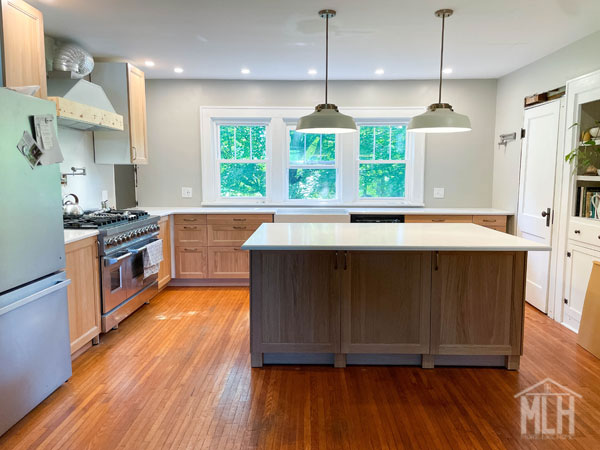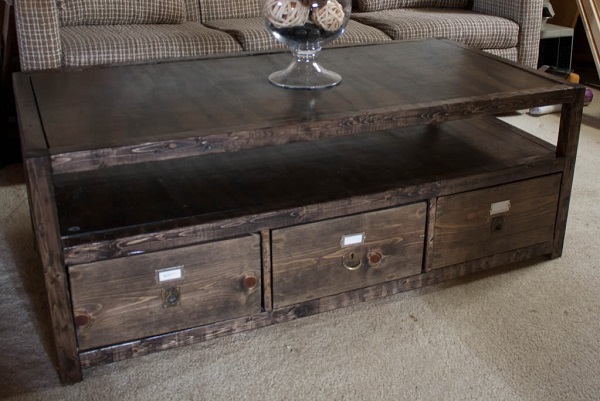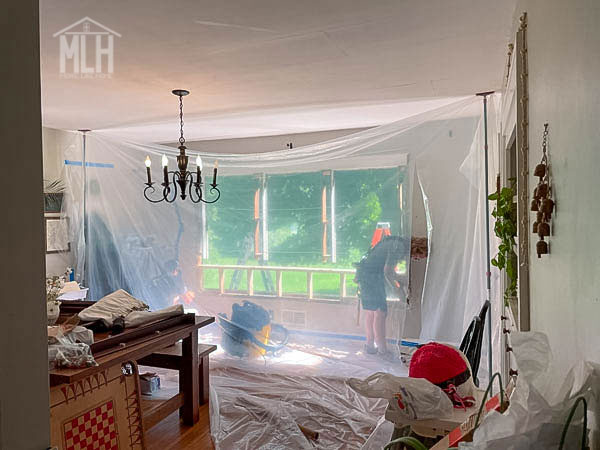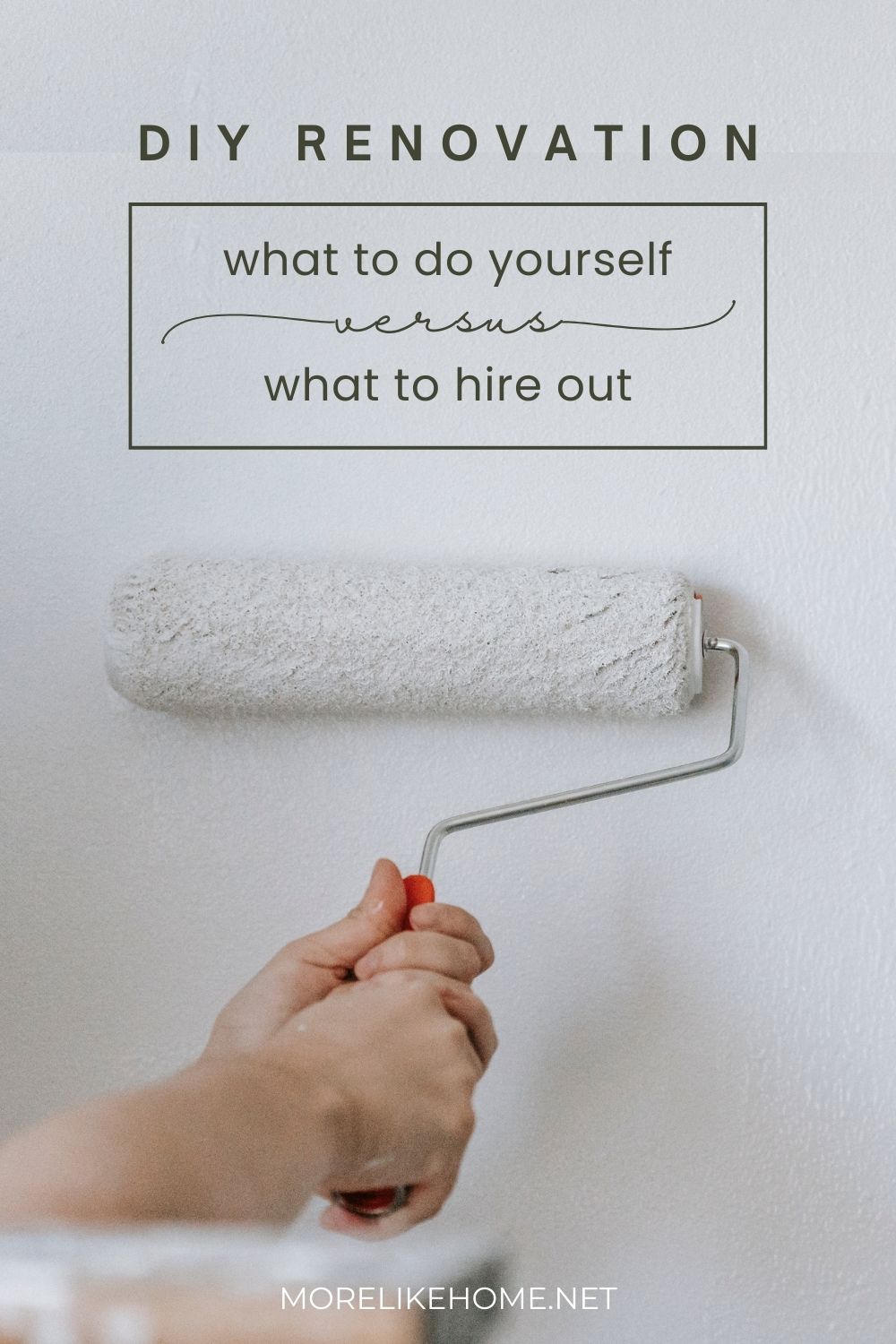I've had a few questions about what we do ourselves vs. what we hire out, so I thought it might be helpful to go into that more in-depth today and talk about not just what we personally hire out, but also how we make those decisions (and I'll walk you through how to make those decisions for yourself as well). It's always a good to have an idea of what you really can (and want to) do yourself before you begin any kind of remodeling project! I addressed this briefly in my post about installing the recessed lighting in our kitchen if you want to check that out as well.
When it comes to home renovation, you're not only deciding how much you want to pay, but also what you want to pay. Because doing things yourself involves a different kind of cost than paying a contractor. While DIY does save money, it costs time instead. Nathan once spent a whole Saturday installing flooring in our dining room with help from a friend and they only got about 75% done. So while we saved a lot of money over having it professionally installed, it cost him a couple days of time instead. See what I mean?
So for every part of your renovation, you need to evaluate your unique needs and decide exactly what you're willing to pay. Find the balance that works for you, your home, and your family. Today I have several tips to help you think through these decisions and I put together a free printable workbook to help you as you work through that thought process! You can get it here:
DIY Renovation Planning Workbook
Things to Consider:
1. Cost of Hiring Out
Get quotes from a couple contractors to get an idea of how much they would charge to complete your project. Be sure to clarify any extra costs (i.e. is the charge just for labor or does it include supplies and materials?). Also consider options for them to only complete parts of the project (i.e. maybe you want to install the cabinets yourself but want a contractor to run water lines and install the drywall). You may find that the cost to hire someone is more manageable than you expected and it's well worth the time it will save you. Or you may find the cost of labor for a particular project so outrageous it's a no brainer to buckle down and do it yourself.
2. Cost of DIY
How much would it cost you to complete this project yourself? This can be tricky to estimate up front because it's often hard to anticipate everything that will go into a project, especially if you're doing it for the first time. But do your best to consider all the supplies and materials you will need for the project. Remember to include any tools you'll need to buy or rent. Compare this total to the estimates you got from contractors to help decide which option is best for you.
3. Time-Cost of Hiring Out
While you're getting pricing quotes from contractors, also ask them the following time-cost questions:
- How long will it take them to complete the project?
- What is their prep-work policy (what will you need to do before they arrive? )
- What is their clean-up policy (will they clean up when they are done or is that left for you to manage?)
- Will you need to be on the premises during the renovation (will you need to take a day or two off of work?)
- How soon would they be able to begin work on the project.
4. Time-Cost of DIY
Now do your best to evaluate how long it will take you to complete the project on your own. Again, this can be tough to estimate. Be honest about when you will be able to actually work on the project (i.e. only in the evenings or on Saturday if you work a regular job) and how many evenings/weekends you think it will realistically take. Are you willing to spend a couple months or more on a renovation as you chip away at it piece by piece? Be sure to leave some buffer room in your planning because unexpected things will always come up, you'll always take more trips to the hardware store than you planned, and you might work slower than you expect (especially if this is your first time trying a new skill)! Remember to give yourself grace if you don't move as fast as you would like, and know that you will get faster and better with practice!
Also consider the time it will take to research/learn the skills needed and evaluate if those skills be useful again in the future. It's worth putting in the time to learn some DIY basics, because once you get the hang of them you'll find there are very few projects you can't tackle yourself! I know all that adds up and the time cost for DIY can seem huge. But that time cost can save an enormous amount of money cost which makes DIY a really great option if your budget is tight! Plus what a gift it is to be able to share your skills when your friends or family are in a pinch!
5. What Skills You Have/Need
Evaluate what skills you already have to contribute to the project. Then evaluate what skills you are lacking that you'll need to learn for this project. It could be something as simple as painting a wall or as complicate as rerouting a water line. Consider where/how you can learn these skills (youtube videos, a family friend, library books, or taking a class). Like I mentioned above, also consider how those skills will benefit you in the future (i.e. once you learn to fix a leaky pipe, you'll neve need to call a plumber for small repairs again!).
Then honestly evaluate how tenacious you are to actually get out there and learn the needed skills. Because here's the thing: like all skills, DIY renovating is something that needs to be learned. And, like all skills, you can learn it if you are willing to put in the effort. It’s easy to feel like you aren’t capable/need a professional but often that’s just because you don’t know how to do it yet. And the more you do, the less intimidating it gets. I want to point out Nathan and I did not have the skills we have now when we got married. We learned from others when we had the chance and we still research new things we want to do, and we have saved thousands of dollars doing them ourselves!
If you're ready to tackle some DIY but are feeling overwhelmed by the scope of your project, consider starting small. Ask yourself: "Can I hire out a portion of this project and do the rest myself?" Pick which skills you are most excited to learn and look into hiring out the rest!
 |
| Installing our own kitchen lighting. |
What We Hire Out
When we get asked if we did something ourselves, the typical answer is "Yes." Early in our marriage we had no money to spare and the only way we could improve (or even maintain) our home was to learn to do things ourselves. Fifteen years and six kids later, we still find that in most instances it is best for us to save the money and do it ourselves. But these days, thanks to the skills we learned in those early years, we don't even bat an eye at the thought. Now when something comes up with the house, most of the time we already have a good idea how to deal with it. Instead of panicking, we roll up our sleeves and take care of it. So I think there's really something to be said for developing the basic skills of DIY and home maintenance.
During this kitchen renovation Nathan I did most of the work ourselves, but there were a few items we chose to hire out. We installed our own cabinets, repaired and replaced drywall, tiled the floor, and Nathan even did all the plumbing and electrical work to relocate all the power and water from the old kitchen to the new kitchen. It sounds like a lot but all of those things used skills we've slowly picked up over the last 15 years of marriage. It all started with building a coffee table in the basement of our first rental house (I turned the building plans into my very first blog post!) and after that we started looking at every project as a DIY opportunity!
 |
| The coffee table that started it all. |
The down-side, of course was the time cost. I'm typing this almost a year and a half after we started the kitchen renovation and it's still not completely finished. So for the past year and a half a key area of our home has been under construction (remember we were putting the new kitchen in our dining room and were able to leave the old kitchen operational until we got the new one barely usable. Then we started tearing out the old kitchen. So, thankfully, we were never without a sink and stove!). We also welcomed a new baby during that time (which, believe it or not, significantly delayed our progress). And I'll be the first to admit, there were days the whole ordeal was pull-you-hair-out frustrating. There was a loooong time when it felt like the whole house was in upheaval and a constant mess. But we had the time to take our time. We could chip away at it as we got the chance.
So if you don't have the budget to hire labor, you really can chip away at a big renovation yourself even if you work a real job and have real kids and a real life. Just don't expect to be done in a week like those full-time influencers. Go into knowing that it might take some time but you will get there and you'll come out of it with some very valuable skills!
HOWEVER, there were three things in this kitchen renovation project we decided to leave up to the professionals. I'll give you a peek at our thought process in deciding to hire out these portions of the renovation:
1. The Windows
I mentioned this in my first kitchen post because before we started installing cabinets we had to replace the windows in the kitchen (our former dining room) and bring them up above countertop height. While I know we could have installed windows ourselves, we were kind of in a time crunch with a baby on the way and winter coming, and a massive hole in the side of the house was kind of a big deal. So we brought in a team of window installers who were in and out in a single day. We're talking windows replaced, drywall patched, siding replaced, the whole deal. And it cost $7000. A huge chunk of our kitchen budget. But it was a planned for chunk. We knew the time cost to DIY a project of that scale (especially one we had never done before) would not be a smart move at that time. And it was such a relief to have something that significant done so fast!
2. Gas Lines
Nathan is familiar with gas lines, but not enough to be comfortable messing with them too much on his own. It's something that can be so dangerous if you mess it up, and it's not always obvious when you do mess it up. We weighed the risks and decided to call in a professional to run the new gas lines to the kitchen.
3. Countertops
We had the countertops professionally installed because we chose quartz tops. Most (if not all) quartz manufacturers actually require that they measure and install it themselves. But even if that weren't the case we probably would have had it installed anyway because quartz is HEAVY and expensive (if THEY drop and break it they are liable to replace it vs. if WE drop and break it we would have to pay for a replacement.) The installers said each piece weighed 500-700 pounds! They had special lifting equipment and tools to do the job carefully and safely that we wouldn't have access to. If we had gone with another kind of countertop we would likely have done the install ourselves (we have installed butcher block and laminate before, and in our last house we poured our own concrete countertops) but since it was quartz we left it up to the pros.
 |
| New windows being professionally installed. |
I hope this helps you work through the decisions for your own renovation. Remember that you're always going to pay with money and time. The question is how much of each you are willing to pay. You have to weigh and balance that for yourself and your family. DIY is a great option if you don't have money to spare, but there's no shame in paying someone else if you can't put in the time.
Don't forget to grab my free project planning workbook here!
What project are you planning?


No comments:
Post a Comment